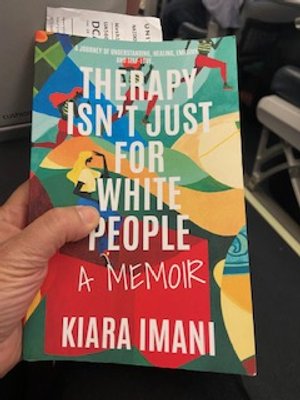#83 Growing up Black in Suburbia
A review of Therapy Isn’t Just for White People by Kiara Imani
When Kiara Imani’s book was introduced to me by her dad, Sanford Williams, I was thoroughly intrigued. I had met Sanford and his wife Anastasia through the Parents Program at the University of Virginia. The program was an organization of parents who donated and raised money for student projects and clubs that did not receive funding through traditional University channels. Several undergraduate scholarships were funded as well. My husband and I would interact with Sandford and Anastasia at the twice-yearly weekend meetings in Charlottesville. They were one of a very small handful of black people who belonged to the Parents Program.
Photo by Ryan Ledbetter
Over the course of meeting with university officials and students, the parents would network and hear directly from the President and Dean of Students. Like the Williams, we were parents of UVA students who were also alumni of the school. My husband and I attended the school as undergraduates. Kiara’s mother, Anastasia, attended the medical school and Sanford, her father, attended the law school. I followed Sanford on Facebook in his role as an elected School Board member in the suburban city of Manassas, Virginia. His social media presence was always positive and inclusive. I live in another area of Northern Virginia and practiced emergency medicine in Alexandria.
Of course, we exchanged lots of updates and news about their three children, Kiara, Johnathan, and Nia. They heard lots about our three kids, as well. I knew about Kiara’s success in beauty pageants and her attendance at the University of Virginia Law School. I knew that her career had taken her to Los Angeles from the bits and pieces posted on her proud dad’s Facebook posts.
I read and review books, so when Kiara’s memoir debuted during the Autumn of 2022, I wanted to read it. What could this intelligent, beautiful, and privileged young lady offer me in a memoir? Those were some hasty and incorrect judgements on my part. She offers a whole lot of interesting perspectives, particularly for those of us who grew up in totally different circumstances. Her journey, that so frequently placed her as the only black person in the proverbial room, could help others understand what that often-traumatic experience might be like. Kiara uses her platform, quite skillfully, to educate and influence her readers on the personal stresses of racial bias, microaggressions, and the harshness of societal beauty norms.
photo by Joan Naidorf
The chapters of Kiara’s book are the stories of various eras in her life. One chapter really caught my attention as an emergency physician. She tells the story of dismissive and dangerous mistreatment at a local Los Angeles emergency department. I have written about the pervasive practice of physicians and nurses exercising both implicit and explicit bias towards their patients. Clinicians are quick to label patients as “difficult” when they behave in ways contrary to our rules and the idealized plan. Kiara believes, and she is not wrong, that her pain and medical problems were minimized because of how she looked, how she was dressed, and the color of her skin.
The chapter entitled, Silent Screams, tells the story how the author showed up at a local emergency department with severe pelvic pain. She said that her pain was not taken seriously and the doctor, who examined her and discharged her “without running any tests.” She was given some pain killers and got worse over the next 24 hours. After talking on the phone to her mother, who is a physician, she was instructed to go back to the ED, but only after changing into clean and nicer clothes.
Kiara narrated the indignity of being triaged and being asked to fill out the paperwork while suffering severe pain and nausea. After throwing up and passing out in triage, she got the correct diagnostic and therapeutic treatment over the next few days. She had an infection of the uterus that required urgent antibiotics. Her physician told her that her condition could have progressed to sepsis, infertility, and death.
The author has no medical background, so her story is narrated through the lens of the ill and suffering patient. I have heard from many patients over the years that the “emergency room doctor did nothing.” They usually mean that some test or treatment they thought that they needed, was not performed or prescribed. Hindsight, as they say, is 20/20. The author’s account is not overly detailed but her diagnosis was missed and the treatment that should have been started on the first visit, was not. Why might this have occurred?
Her story highlights an all-too-common occurrence of “medical gaslighting.” The New York Times ran an article by Melinda Wenner Meyer In March of 2022 entitled: Women are Calling Out Medical Gaslighting. In this phenomenon, a physician or other medical professional dismisses or downplays a patient’s physical symptoms or attributes them to something else, such as a psychological condition. Thousands of people, notably women of color, responded in the comment section that they had also experienced medical gaslighting.
It appears that Kiara suffered the worst of medical gaslighting. Were the complaints of pain from a woman given short shrift by the male physicians who took care of her? Was she mis-treated and misjudged as a black woman behaving dramatically to get strong pain-relievers? Were the complaints of a young black woman, even one identified by the physician as an attorney, minimized and overlooked by the physicians because they thought they could and they were convinced (incorrectly) that nothing serious could be going on? Yes, yes, and yes. Sigh
The inclusion of this chapter in her memoir serves to make readers aware that this sort of poor treatment occurs regularly in our country. In a way that supposedly innocuous activities can be fraught with danger for black people: driving, jogging through the neighborhood, and bird-watching in the park, so can showing up at the emergency department or labor and delivery unit. Even the well-to-do daughter of a doctor can be treated poorly and marginalized. Quite a few practicing physicians are not even aware of their implicit biases. I have discussed this issue with several colleagues. They all believe that they treat everyone the same, regardless of the color of their skin.
Discussions of systemic racism and social determinants of health affecting large swaths of the population are deemed to be philosophic and societal issues for other folks to worry about. In the truncated visits of the emergency department, the shortcuts and assumptions made by the physicians and nurses can have devastating consequences. When people get labelled as drug-seeking, manipulative, and difficult, the clinicians can miss what disease process or injury has actually occurred. Both micro and macro forms of insults, racism, and mistreatment are still occurring amongst professionals who strive to be color-blind. (Myself included) The biases are so baked-in to the system and ourselves, we just do not see them. These are not bad people. They are just people.
Meeting Kiara at a book signing in DC 10/2022
Fortunately, Kiara recovered fully from her illness. The way that she was treated, left emotional scars, and taught her another valuable lesson. The message from this chapter and so many of the memories recounted in her book, were discussed, and processed in sessions she had with her therapist. The author’s very honest airing of her life story and how she gets mental health treatment, serves as an example for other black people who shy away from getting basic medical and mental health treatment. This explains the book’s title: Therapy Isn’t Just for White People.
As visible influencer on a local radio station in Los Angeles, national publications, and on social media, Kiara Imani Williams serves to educate and lead by example. As a member of entirely different demographic and religious tradition than she, I did not know what to expect when I picked up her book. The curtain was pulled back on some places I had never gone to or even knew about. The reader will experience some of her joys and many of her disappointments. As a new mother, she has started a new blog to chronicle her insights and experiences. I am so glad that she had the courage to share the experiences from her life so far and I cannot wait to see what else she will share.



